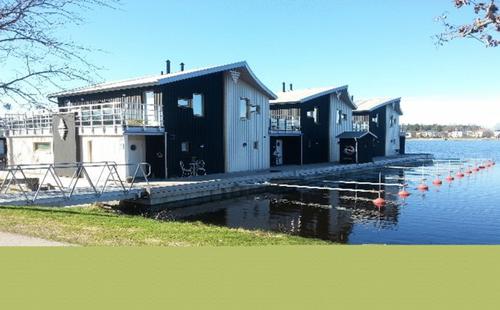Journal of Housing and the Built Environment ( IF 1.8 ) Pub Date : 2022-04-15 , DOI: 10.1007/s10901-022-09942-4 Sofie Storbjörk 1 , Mattias Hjerpe 1

|
With climate change already underway, cities are looking for ways to deal with its effects. To balance urban waterfront development and climate adaptation, floating housing is presented as a promising solution—however it has not been studied sufficiently. This paper explores floating housing as urban climate experimentation, targeting vision/motivation, practice and upscaling in a national context where support mechanisms and traditions are absent. Interviews with innovation entrepreneurs and municipal planners involved with planning and building floating districts show that, with one exception, the Swedish initiatives are at odds with the theoretical assumptions behind urban climate experimentation. Initiatives are neither challenge-led in terms of climate risk nor inclusive and community-based. Rather, the small-scale private entrepreneurs are pioneers in offering unique living on water as one-off innovations. While allowing experimentation, municipal planners are less convinced by the effectiveness and appropriateness of upscaling. Floating housing may contribute to local identity building and place marketing, but are riddled with implementation challenges regarding shoreline protection, privatization/accessibility, limited market interest and urban development fit. While the floating houses themselves withstand flooding, thus safeguarding individual house owners, they do not protect the land-based city with its vulnerable waterfront development patterns. Results thus suggest the limitation of floating houses in shifting development pathways and strengthening urban climate proofing.
中文翻译:

陷入实验:探索瑞典使用浮动房屋进行气候防护的滨水城市发展的实践经验和挑战
随着气候变化已经开始,城市正在寻找应对其影响的方法。为了平衡城市滨水区开发和气候适应,浮动房屋被认为是一种很有前景的解决方案,但尚未得到充分研究。本文探讨浮动住房作为城市气候实验,在缺乏支持机制和传统的国家背景下针对愿景/动机、实践和升级。对参与规划和建设浮动区的创新企业家和市政规划师的采访表明,除了一个例外,瑞典的举措与城市气候实验背后的理论假设不一致。倡议既不是以气候风险为主导的挑战,也不是包容性和基于社区的。相当,小型私营企业家是提供独特水上生活作为一次性创新的先驱。在允许试验的同时,市政规划者不太相信升级的有效性和适当性。浮动房屋可能有助于当地的身份建设和地方营销,但在海岸线保护、私有化/可及性、有限的市场兴趣和城市发展适合性方面存在实施挑战。虽然浮动房屋本身可以抵御洪水,从而保护个人房主,但它们并不能保护这座陆地城市及其脆弱的滨水开发模式。因此,结果表明浮动房屋在改变发展路径和加强城市气候防护方面存在局限性。











































 京公网安备 11010802027423号
京公网安备 11010802027423号